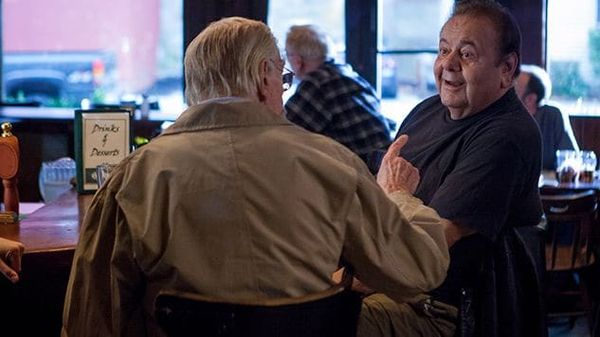Eye For Film >> Movies >> Abe And Phil's Last Poker Game (2017) Film Review
Abe And Phil's Last Poker Game
Reviewed by: Jennie Kermode

Around one in every 20 Americans over the age of 65 lives in a care home or some type of assisted living community. That's around nine million people, so how come we never see their stories on the big screen? Abe & Phil's Last Poker Game attempts to explore what life can be like in such places, and although it's not entirely successful as a film, its balance of comedy and tragedy serves to demystify a part of life too often hidden away.
Perhaps that is to describe it in overly grandiose terms. The awful weight of mortality is recognised here but not unduly lingered on. Comedy is certainly attempted but not all of it hits the mark. In the context of today's Hollywood, the old staple of men bonding by belittling women is acquiring a different flavour. It may be realistic, especially given the age of the characters, but there is no knowing edge here, nor any wit to redeem it. It's given context by the central character's total disinterest in how certain of his actions might affect his wife, and it diminishes a sub-plot that might be read as a slightly creepy encounter with an exploitative gerontophile but is all too easy to interpret as a simple assumption that younger women will make themselves available to male protagonists as required.

That central character is Abe (Martin Landau), an eightysomething doctor who may not really need to be in the care home himself but wishes to stay with his wife, who is suffering from dementia. Initially, she is his prime focus, but perhaps because he has cared for her for a long time he is glad to leave that to the staff as she gets used to them, focusing instead on friendship with Phil (Paul Sorvino), a man with a very different life history (and large amounts of cash hidden in his room) who seem relieved to have acquired a clear-minded companion. As the two get to know each other and attempt to embark on sexual adventures despite having uncooperative bodies, they both develop an unexpected sense of attachment to a young nurse.
Neither Abe nor Phil has children that they know of. Angela (Maria Dizzia, who captures the sweetness and practicality essential to geriatric nursing very effectively) was adopted and hopes to find her birth father, whom she believes may be a resident in the home. Could she be a product of one of their youthful adventures? Abe takes a scientific approach to the matter; for Phil, it is a matter of faith. Neither really takes in what Angela is feeling, nor anticipates that the closeness they are developing might come to mean more than an accidental genetic relationship anyway.
There's a nice idea here. One can feel it straining to get out, bubbling beneath the flat surface of a film that never really seems to know what it wants to say. With the exception of Dizzia, the capable actors never really succeed in bringing the awkward script to life, with the result that it's all too easy to empathise with the frustrations of spending life in a place where not much happens. The film would benefit from tighter editing and the loss of 20 minutes or so of unnecessary material. As is, it spends too long going nowhere in particular in a manner we have all seen before.
Reviewed on: 08 Jan 2018















